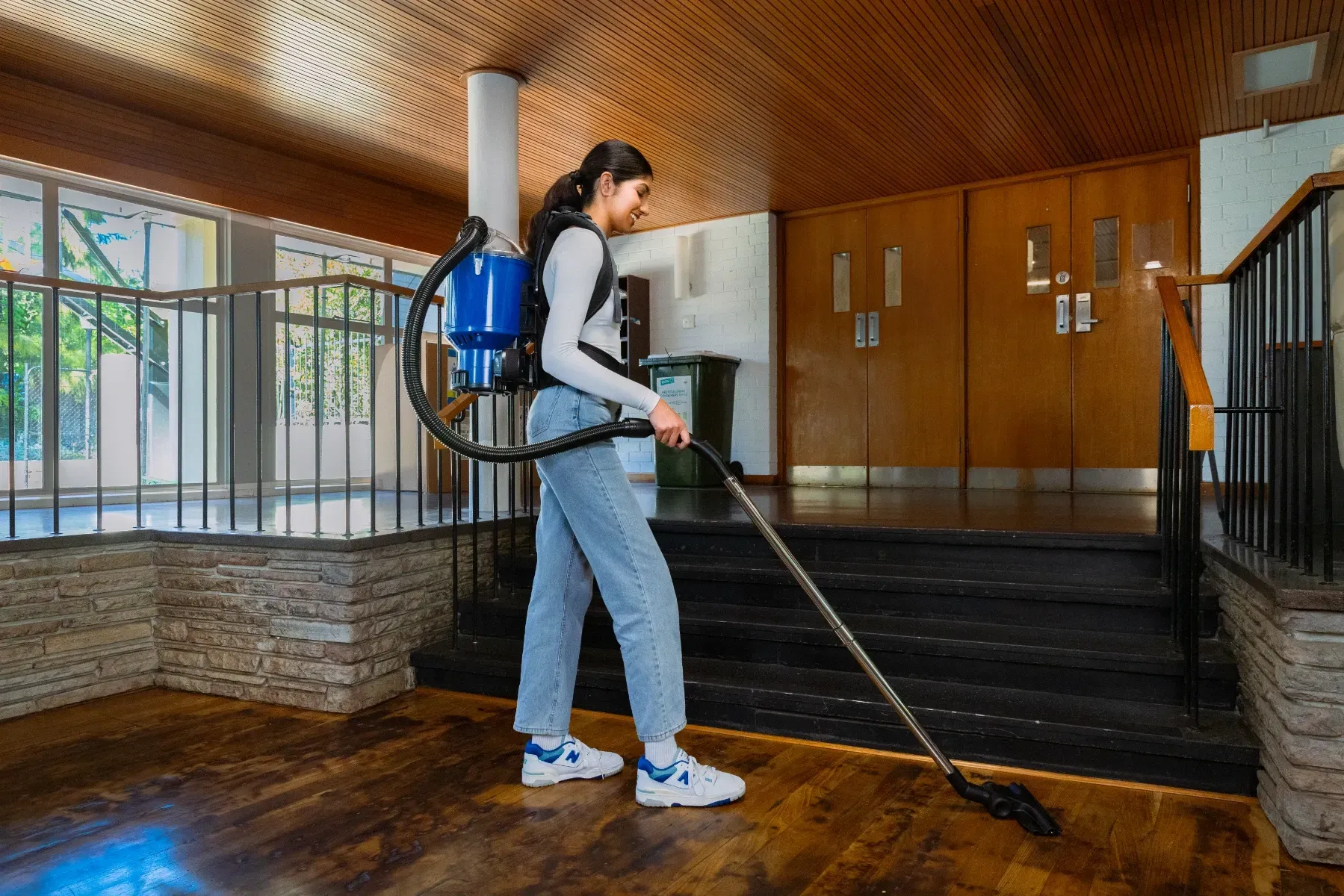By Sharon Keevins
•
January 13, 2026
Introduction Choosing the right commercial scrubber dryer is one of the most important decisions a business can make when it comes to maintaining clean, safe, and professional floor spaces. Across Cornwall and Devon, more organisations are moving away from inefficient manual methods and investing in scrubber dryers to improve cleaning performance, reduce labour time, and maintain better hygiene standards across high-traffic areas. Whether you manage a warehouse, retail unit, school, healthcare setting, hotel, or industrial premises, scrubber dryers help you achieve a consistent standard of cleanliness that is difficult to maintain with traditional mopping. But with several types of scrubber dryer available, it can be difficult to know which one is best suited to your site, your staff, and your day-to-day requirements. One of the most common questions we hear is: should you choose a walk-behind scrubber dryer or a ride-on scrubber dryer? In this guide, we’ll explain the differences, highlight the key benefits of both, and help you understand which machine is most suitable for your business. At Cornwall Vacuum Services (CVS) , we support businesses across Cornwall and Devon with commercial floor cleaning equipment, including supply, hire solutions, servicing, repairs, and long-term maintenance support. What Is a Commercial Scrubber Dryer? A commercial floor scrubber dryer is a professional cleaning machine designed to wash and dry hard floors quickly and efficiently. Unlike basic cleaning methods which may involve mops and buckets, scrubber dryers deliver a more reliable clean by using controlled water flow, scrubbing action, and water recovery in one continuous process. In simple terms, a scrubber dryer works by applying cleaning solution to the floor, scrubbing the surface using rotating brushes or pads, and then vacuuming up the dirty water immediately after. This leaves floors noticeably cleaner and, crucially, far drier than traditional manual cleaning methods. This can make a significant difference in commercial settings where slip hazards, hygiene standards, and presentation all matter. Scrubber dryers are especially valuable in busy environments where floors need to be cleaned during operational hours or in short cleaning windows, such as between shifts, during quiet retail periods, or overnight. Because they reduce the time floors stay wet, they help create safer spaces and reduce disruption for staff and customers. For many organisations, a commercial scrubber dryer is not simply a cleaning upgrade — it’s a practical investment in operational efficiency and safety. Walk-Behind Scrubber Dryers: Best for Control and Tight Areas A walk-behind scrubber dryer is operated by walking behind the machine and guiding it as it cleans. These machines are widely used because they offer excellent control, strong cleaning performance, and the flexibility to work in areas where space is limited or obstacles are common. In environments such as schools, retail spaces, leisure centres, and healthcare buildings, floor layouts often include corridors, entrances, corners, furniture, doorways, and changing floor zones. Walk-behind machines make it easier to clean around these features without sacrificing cleaning performance, and they allow operators to maintain consistency even in complex layouts. Walk-behind scrubber dryers are also popular because they typically provide a good balance of performance and ease of use. Many organisations need a machine that staff can operate confidently without extensive training, particularly where cleaning is carried out by multiple team members or across multiple shifts. Walk-behind machines can also be easier to store and transport between areas, which is important for facilities with limited storage. Another major advantage is their suitability for regular, scheduled cleaning routines. Businesses that need frequent cleaning in medium-sized spaces often find that walk-behind scrubber dryers deliver the best overall balance between performance, cost, and practicality. From a hygiene perspective, walk-behind machines are widely used in education and healthcare environments where consistent floor cleaning is essential. When correctly specified, they can provide reliable scrubbing performance while leaving surfaces clean and dry enough to reopen quickly. Ride-On Scrubber Dryers: Best for Speed and Large Floor Areas A ride-on scrubber dryer is designed for productivity on a larger scale. Instead of walking behind the machine, the operator sits on the scrubber dryer, making it ideal for cleaning large open spaces quickly and efficiently. For warehouses, logistics centres, large retail spaces, manufacturing sites, and multi-storey facilities, ride-on machines offer a significant advantage in time saved and cleaning output. The greatest benefit of a ride-on scrubber dryer is the amount of floor area it can cover in a short time. This makes it especially valuable in environments where floor cleaning needs to be completed quickly to avoid disrupting operations. Large facilities often cannot afford lengthy cleaning downtime, and ride-on machines help achieve thorough cleaning while maintaining productivity. Ride-on scrubber dryers are also ideal where operator comfort matters. In large environments, walking behind equipment for long cleaning sessions can lead to fatigue, inconsistent results, and slower completion times. Ride-on machines reduce physical strain and allow operators to maintain consistent cleaning quality across extended periods of use. These machines are frequently used in distribution centres, warehouses, supermarket floors, large educational sites, multi-unit retail spaces, and industrial premises where floor space is extensive and cleanliness affects safety and compliance. In many high-use environments, ride-on scrubbers are an essential part of maintaining a safe and presentable site, particularly where dust, debris, tracked-in contamination, or production waste can accumulate quickly. A ride-on scrubber dryer can also support improved cleaning consistency, because the equipment is designed for continuous cleaning and efficient coverage. For many businesses, it becomes the backbone of routine floor maintenance, reducing the reliance on manual cleaning for large areas. How to Choose the Right Scrubber Dryer for Your Business Although the walk-behind vs ride-on decision is important, the most effective scrubber dryer choice depends on a combination of factors. The starting point is usually the physical size of your floor area, but layout, floor type, and cleaning schedules all play a role in determining the best machine for your needs. If your facility includes narrow corridors, restricted turning spaces, or areas with frequent obstacles, a walk-behind scrubber dryer is often the most practical choice. However, if your environment includes large open spaces with long, uninterrupted floor runs, a ride-on scrubber dryer may provide far greater efficiency. Floor type is another key consideration. Commercial floors vary widely, from safety flooring and tiles through to sealed concrete, vinyl, and resin. Different surfaces can require different brush types or pad combinations to achieve the best results while protecting the floor finish. Cleaning frequency also matters. A site that cleans daily will typically benefit from a machine designed for continuous use and consistent performance. Businesses with less frequent cleaning requirements may prioritise flexibility and ease of storage. You should also consider your staff and how the equipment will be used day-to-day, particularly in shared environments where multiple people may operate the machine. In many cases, the right choice comes down to choosing the best equipment for your operational reality rather than choosing based purely on size or price. An expert recommendation often helps avoid over-investing or choosing equipment that is not suited to the demands of the site. Scrubber Dryer Sales, Hire and Leasing Options Many businesses assume they must purchase a scrubber dryer outright, but in practice there are several commercial options available. The right route depends on budget planning, usage levels, and whether the equipment is needed long-term or for a specific time period. Outright purchase is often a strong choice for businesses with ongoing cleaning needs, particularly where the scrubber dryer will be used frequently across the year. Purchasing gives complete ownership and allows organisations to integrate the machine into long-term cleaning schedules without limitation. Scrubber dryer hire is useful for businesses that need temporary access to equipment, such as for short-term contracts, deep cleaning projects, seasonal peaks, or emergency replacements when an existing machine is out of service. Hiring can also be an effective way to trial equipment types before committing to purchase, giving businesses more confidence in their long-term decision. Leasing can be an excellent solution for organisations that want predictable monthly costs and wish to protect working capital. It can also help businesses access higher-spec machines than they might otherwise purchase outright, improving performance while maintaining financial control. Leasing is commonly used by schools, hospitality groups, facilities management companies, and multi-site organisations that need reliable cleaning equipment without large upfront expenditure. At CVS, we support customers in selecting the right approach based on operational needs and business goals, ensuring scrubber dryer investment is practical and sustainable. Why Scrubber Dryer Servicing and Maintenance Matters Scrubber dryers are built for commercial environments, but they still require regular servicing and maintenance to perform at their best. Like any mechanical equipment, performance issues can develop over time due to wear, heavy use, or a lack of routine checks. Common performance problems can include reduced water pickup, inconsistent cleaning results, brush wear, battery performance issues, or vacuum system blockages. These issues often start small but can quickly lead to reduced productivity, increased cleaning times, or a total breakdown during critical operational periods. Planned servicing helps to prevent problems before they become expensive. It ensures key components are checked, wear parts are replaced when needed, and performance remains consistent. For organisations that rely on daily cleaning, preventative maintenance is often the most cost-effective approach because it reduces downtime and extends equipment life. Servicing also supports hygiene and safety compliance. If a scrubber dryer is not recovering water properly, floors can remain wet and create slip risks. If brushes are worn, cleaning quality drops. Regular maintenance ensures the machine continues to deliver the results it was purchased for. CVS provides scrubber dryer servicing, repair support, and longer-term maintenance assistance, helping businesses protect their equipment investment and keep cleaning operations running smoothly. Which Scrubber Dryer Should You Choose? Walk-behind and ride-on scrubber dryers both provide significant benefits for commercial cleaning operations, but they solve different problems. Walk-behind machines are typically best for control, flexibility, and cleaning in tighter or more detailed environments. Ride-on machines excel in speed, productivity, and large-area cleaning performance. For many organisations, the right decision depends on how the site operates day-to-day. Some businesses even choose to use both types across different areas, particularly where there is a mix of corridors, customer-facing spaces, and large open floors. The goal is always the same: choose a scrubber dryer that supports consistent cleaning results, reduces downtime, and fits naturally into your business’s working routine. Speak to CVS About Commercial Scrubber Dryers in Cornwall & Devon If you’re considering a commercial scrubber dryer in Cornwall or Devon , CVS can help you make a confident, informed decision. We support businesses across the region with professional floor cleaning equipment, helping customers source machines that suit their environment, their sector, and their long-term operational needs. From guidance on walk-behind and ride-on scrubber dryers through to hire options, servicing, repairs, and maintenance planning, our team offers dependable support at every stage. If your organisation needs a reliable solution for improving floor safety, cleaning standards, and efficiency, we’re here to help.












